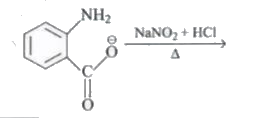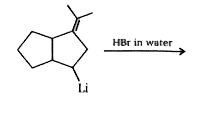In which of the following reaction formation of reaction intermediate does not take place?
Isomerisation reaction
Pericyclic reaction
Substitution reaction(SN1)
Elimination reaction (E1)
To determine in which of the following reactions the formation of a reaction intermediate does not take place, we will analyze each type of reaction mentioned in the question.
1. Isomerization Reaction:
- Example: Keto-enol tautomerization.
- In this reaction, a keto compound (e.g., CH3C(=O)CH3) is converted to its enol form (e.g., CH2=CHOH).
- During this process, a reaction intermediate (the enolate ion) is formed when the hydroxide ion attacks the keto carbon, leading to a transition state before the final product is formed.
- Conclusion: An intermediate is formed.
2. Pericyclic Reaction:
- Example: (2+2) cycloaddition of buta-1,3-diene and ethene.
- In pericyclic reactions, the reaction occurs in a concerted manner, meaning that all bond-making and bond-breaking processes occur simultaneously without the formation of discrete intermediates.
- Conclusion: No intermediate is formed.
3. Substitution Reaction (SN1):
- Example: SN1 reaction of a tertiary alkyl halide.
- In this mechanism, the leaving group (e.g., Cl) departs first, forming a carbocation intermediate. This is followed by the nucleophilic attack.
- Conclusion: An intermediate (carbocation) is formed.
4. Elimination Reaction:
- Example: Dehydrohalogenation of alkyl halides.
- In elimination reactions, a leaving group (e.g., Cl) is removed, often forming a carbocation intermediate before the double bond is formed.
- Conclusion: An intermediate (carbocation) is formed.
Final Answer:
Based on the analysis, the reaction in which the formation of a reaction intermediate does not take place is the Pericyclic Reaction.
- Example: Keto-enol tautomerization.
- In this reaction, a keto compound (e.g., CH3C(=O)CH3) is converted to its enol form (e.g., CH2=CHOH).
- During this process, a reaction intermediate (the enolate ion) is formed when the hydroxide ion attacks the keto carbon, leading to a transition state before the final product is formed.
- Conclusion: An intermediate is formed.
- Example: (2+2) cycloaddition of buta-1,3-diene and ethene.
- In pericyclic reactions, the reaction occurs in a concerted manner, meaning that all bond-making and bond-breaking processes occur simultaneously without the formation of discrete intermediates.
- Conclusion: No intermediate is formed.
- Example: SN1 reaction of a tertiary alkyl halide.
- In this mechanism, the leaving group (e.g., Cl) departs first, forming a carbocation intermediate. This is followed by the nucleophilic attack.
- Conclusion: An intermediate (carbocation) is formed.
- Example: Dehydrohalogenation of alkyl halides.
- In elimination reactions, a leaving group (e.g., Cl) is removed, often forming a carbocation intermediate before the double bond is formed.
- Conclusion: An intermediate (carbocation) is formed.
Based on the analysis, the reaction in which the formation of a reaction intermediate does not take place is the Pericyclic Reaction.
Topper's Solved these Questions
- ORGANIC CHEMISTRY : SOME BASIC PRINCIPLES AND TECHNIQUES BOOK - AAKASH INSTITUTE ENGLISHCHAPTER - ORGANIC CHEMISTRY : SOME BASIC PRINCIPLES AND TECHNIQUES EXERCISE - Assignment(SECTION-A)
68 Videos
- ORGANIC CHEMISTRY : SOME BASIC PRINCIPLES AND TECHNIQUES BOOK - AAKASH INSTITUTE ENGLISHCHAPTER - ORGANIC CHEMISTRY : SOME BASIC PRINCIPLES AND TECHNIQUES EXERCISE - Assignment(SECTION B)
6 Videos
- ORGANIC CHEMISTRY : SOME BASIC PRINCIPLES AND TECHNIQUES BOOK - AAKASH INSTITUTE ENGLISHCHAPTER - ORGANIC CHEMISTRY : SOME BASIC PRINCIPLES AND TECHNIQUES EXERCISE - Try Yourself
28 Videos
- MOCK_TEST_20BOOK - AAKASH INSTITUTE ENGLISHCHAPTER - MOCK_TEST_20EXERCISE - EXAMPLE
29 Videos
- ORGANIC CHEMISTRY: SOME BASIC PRINCIPLE AND TECHNIQUESBOOK - AAKASH INSTITUTE ENGLISHCHAPTER - ORGANIC CHEMISTRY: SOME BASIC PRINCIPLE AND TECHNIQUESEXERCISE - TRY YOURSELF
28 Videos
Similar Questions
Knowledge Check
Which of the following reactions involve benzyne intermediate?
A B
B C
C D
D
In Which of the following reaction an acid-base reaction takes place ?
A B
B C
C DAll of these
DAll of theseWhich of the following reactions involve free radical as intermediate?
A B
B C
C D
D
Which of the following reaction does not take place ?
View SolutionWhich of the following reactions does not take place?
View SolutionWhich of the following reactions does not take place?
View SolutionWhich of the following reaction leads to the formation of secondary alcohol?
View SolutionWhich of the following reactions does not take place?
View Solution
